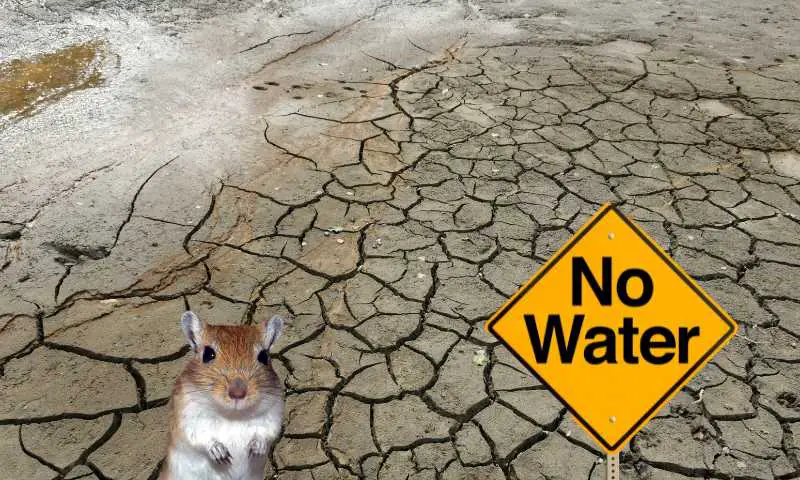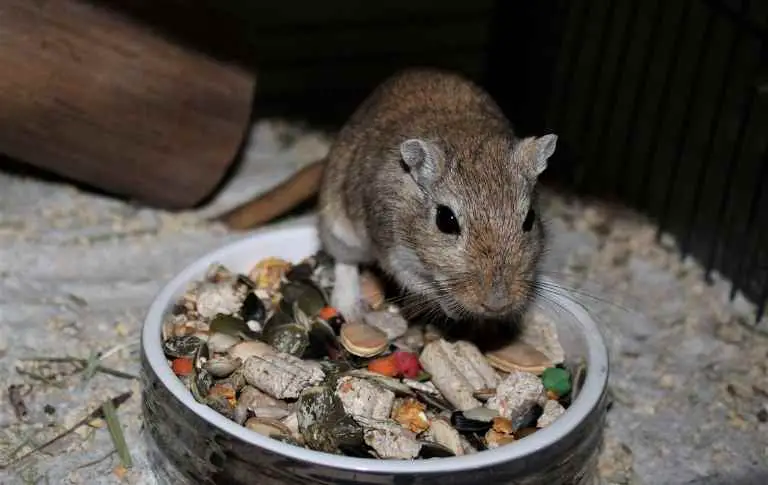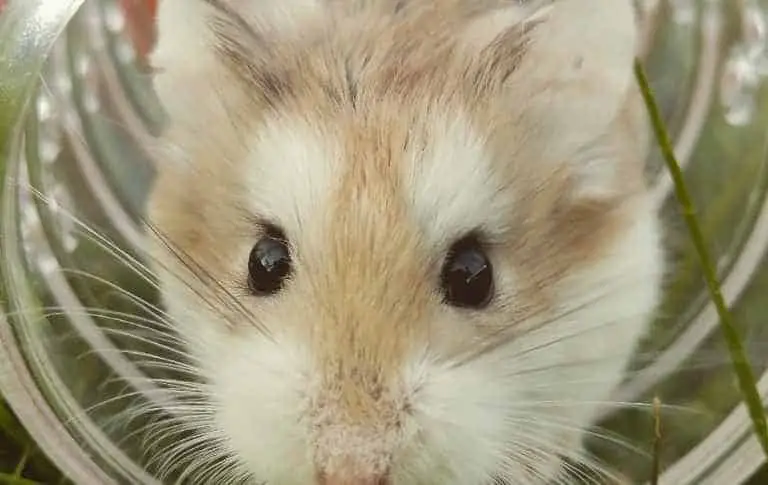As any pet owner knows, the health of your furry friend is vitally important. For gerbil owners, one of the most important things to know is how long a gerbil can go without water.
After all, if you are ever away from home or on vacation, you want to make sure your little rodent buddy has enough hydration! Read on to learn more about how long a gerbil can go without water.
Table of Contents
How Long Can Gerbils Go without Water
Gerbils get a lot of the water they need from their food—mainly from fruits and vegetables—but it is still important for them to have access to fresh drinking water every day.
A healthy gerbil should drink around 3-5ml of water per day. If there is no access to fresh water, then they will start to become dehydrated, which can be dangerous for them.
In general, a gerbil can survive for around 4 – 7 days without any water. However, this does not mean that you should let them go without!
It is still essential that you provide your gerbil with fresh water daily as dehydration can quickly lead to serious health complications, including kidney damage and organ failure.
If you are going away on vacation or will not be able to provide fresh drinking water for a few days, then consider getting an automatic watering system that will ensure your gerbil has plenty of fresh drinking water while you’re away.
This type of system consists of a bottle that attaches directly to the side of the cage and automatically dispenses the right amount of clean drinking water into the cage throughout the day.

How Often Should Gerbils Drink Water?
If you’ve recently welcomed a gerbil into your home, you may have some questions about how to properly care for it. One of the most important things to know is how much water your gerbil needs.
we’ll break down everything you need to know about how often gerbils should drink water, from how much they need each day to the best way to provide it.
Gerbils typically drink around 4ml of water every day—that’s about one teaspoonful. However, this amount can vary depending on the size and activity level of your pet—some gerbils may require more or less than others.
Anywhere between 3ml and 5ml, a day is normal; if your gerbil is drinking more or less than that, there may be an underlying health issue. It’s always best to consult with a vet if you have any concerns about your pet’s health or behavior.
u003cemu003eRecommended – u003c/emu003eu003ca href=u0022https://spicyanimals.com/how-to-catch-a-gerbil/u0022u003eHow to Catch a Gerbil? With Tips!u003c/au003e
What Are the Best Ways To Provide Water?
It’s important to provide clean, fresh water for your gerbil on a daily basis. The easiest way is with a drip bottle, although you can also use a bowl if you prefer—just make sure it won’t tip over easily (gerbils are notorious escape artists!).
Change out the water in either the bottle or the bowl at least once per day and clean them weekly with mild soap and warm water (avoid using harsh chemicals).
You should also check frequently for any signs of contamination in order to keep your pet safe and healthy. Another thing to keep in mind is that tap water contains trace amounts of chlorine and other chemicals which can be harmful to small animals like gerbils; consider using filtered or distilled bottled water instead.
And finally, make sure that any food containers (such as hay racks) are located away from the source of fresh drinking water so that food particles don’t contaminate it.
How Can I Tell if My Gerbil Is Dehydrated?
Dehydration is one of the most common health issues that can affect gerbils. While it’s easy to tell if a human or even a dog or cat is dehydrated, it can be harder to recognize the signs of dehydration in a small rodent like a gerbil.
Knowing when your gerbil isn’t getting enough fluids is important for keeping it safe and healthy. Here’s what you should look out for.
Signs of Dehydration in Gerbils
The most obvious sign of dehydration in a gerbil is its skin condition. If your gerbil is dehydrated, its skin will be dry and wrinkled, rather than soft and supple.
To test this, gently pinch the skin on its back between your thumb and index finger—if it doesn’t spring back immediately, chances are it’s dehydrated.
Other signs include:
- lethargy (your gerbil will be lying limp in its cage with hardly any movement),
- lack of appetite,
- and dark-colored urine.
If you spot any of these symptoms, take your gerbil to the vet right away for a thorough examination and possible treatment. It’s also important to make sure your gerbil has access to plenty of fresh water at all times—after all, prevention is always better than cure!
Make sure you change the water regularly; if it’s been sitting there for more than two days, chances are it has lost some of its nutrients and will no longer provide adequate hydration for your pet.
It’s not always easy to tell if your gerbil is dehydrated but recognizing the signs early on can help keep them healthy and safe.
Can Gerbils Drink Water out Of a Bowl?
Are you an aspiring gerbil owner who wants to make sure your pet is happy and healthy? If so, then you probably have a lot of questions about how to care for your animal.
One question that comes up often is whether or not gerbils can drink water out of a bowl. The answer is yes—they can—but there are some important things to keep in mind.
Why Use a Bowl?
The simplest way to provide your gerbil with water is to fill up a bowl and place it in its cage. This method has the advantage of being easy and cost-effective, as there’s no need for special equipment like water bottles or automatic feeders.
However, there are some drawbacks to using a bowl for water. For starters, it’s possible for the water to get contaminated more quickly than if you were using another type of container.
Secondly, many gerbils will kick bedding into their bowl, making the water dirty and potentially unhealthy for them to drink.
Finally, bowls can be easily knocked over if your gerbil is particularly active or curious!
Water Feeders
Most experts would recommend using a bottle-style feeder instead of a bowl when providing your gerbil with drinking water. These feeders are designed specifically for small animals like rodents and they attach directly to the side of the cage.
As such, they’re much less likely to be spilled or knocked over than other types of containers. Additionally, they come with handy features like built-in filters that help keep the water clean and fresh at all times.
Furthermore, many models come with anti-spill valves that prevent any leakage from occurring even if your gerbil does manage to tip over the bottle (which isn’t likely).
Teach Your Gerbil To Drink From A Waterfeeder
If you’re the proud parent of a gerbil, then you’ll want to provide your pet with fresh, clean water at all times. Unfortunately, gerbils may not immediately take to drinking from a water feeder.
Don’t worry! With patience and consistency, you can teach your gerbil to drink from its water feeder in no time. Let’s take a look at how to do it.
Choose The Right Feeder
When shopping for a water feeder, make sure it’s the right size and shape for your gerbil.
The feeder should be big enough that it doesn’t tip over easily and small enough that your gerbil can reach the top of the bottle without having to climb on it or jump up too high.
Introducing The Feeder
Once you have the right feeder, start by placing it inside the cage near where your gerbil typically eats or hangs out. Make sure the spout is low enough so that they can reach the water when standing on their hind legs.
Put a few drops of water at the entrance of the spout so that your gerbil can explore it and become familiar with how it works. This will give them an idea of what to expect when they drink from it in the future.
Encourage Drinking From The Feeder
Once your gerbil knows what to expect from their new water feeder, you can begin encouraging them to use it. Wet the tip and gently put your finger on it so that a few drops come out.
This will show them what the feeder is for and how to use it. if they still not using the feeder gently put the tip of their nose to the water spout and move it around and this should encourage them to start drinking.
Teaching your gerbil how to drink from a water feeder is not as hard as it seems! With patience and consistency, you can introduce this essential item into their habitat without too much fuss.
Keep in mind that every gerbil is different, so don’t be discouraged if yours isn’t interested in their new toy right away—it just might take some time for them to get used to it! With these tips, you’ll be able to keep your beloved pet hydrated and healthy for years to come!
Sources:
- Gerbil Q&A and General Information
- A collection of questions and answers related to gerbils, providing general information for owners.
- Gerbil Health and Care Guides
- Comprehensive guides on gerbil health and care, offering insights and advice for gerbil owners.
- American Veterinary Medical Association (AVMA)
- Official website of the American Veterinary Medical Association, offering resources and information related to animal health and care.
- PetMD – Gerbil Care
- A comprehensive guide on how to care for gerbils, including their dietary needs, habitat, and health concerns.
- National Gerbil Society
- The official website of the National Gerbil Society, providing information on gerbil care, breeding, and shows.
- RSPCA – Gerbil Care
- The Royal Society for the Prevention of Cruelty to Animals’ guide on gerbil care, including their needs and potential health issues.
- Petco – Gerbil Care Sheet
- A care sheet from Petco detailing the essentials of gerbil care, from diet to habitat.
- Gerbil Information from Merck Veterinary Manual
- Detailed information on gerbil health and care from the reputable Merck Veterinary Manual.
- Cornell University – Small Mammal Health Series
- A series of articles from Cornell University’s College of Veterinary Medicine on the health and care of small mammals, including gerbils.
- Wikipedia – Mongolian Gerbil
- Comprehensive information about the Mongolian gerbil, its habitat, behavior, and history.




